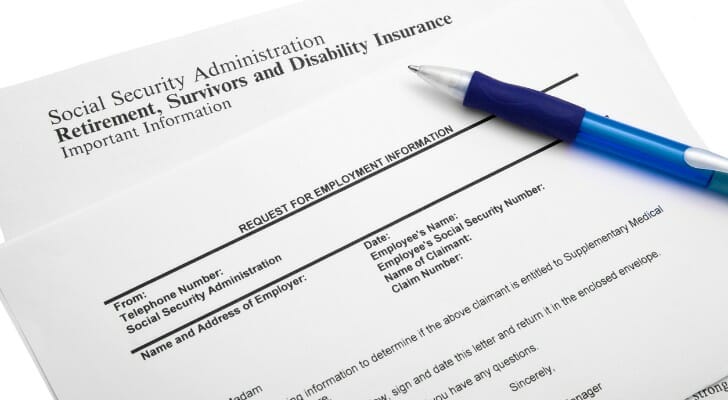Social Security benefits can serve as an additional income stream in retirement, but they can also be paid out under other circumstances. For instance, Social Security survivor benefits can be paid to the widows, widowers and dependents of eligible workers who have died. If you’re married and have young children, you may be able to receive survivor benefits if your spouse passes away, even if retirement is still decades off. Social Security survivor benefits are not a substitute for cash savings or life insurance. However, they can provide some financial relief to loved ones who are left behind.
A financial planner could help you create a financial plan to reach your retirement goals.
What Are Social Security Survivor Benefits?
Social Security survivor benefits are paid to eligible family members of workers who have passed away. That can include a spouse, child or even a parent. Benefits are received as a monthly payment, the same way regular Social Security retirement benefits or disability benefits are paid.
Survivor benefits can be used to cover day-to-day living expenses that would otherwise have been covered by the deceased person’s income. For example, survivor benefits can be used to pay for housing, utilities, food and other basic expenses.
Social Security survivor benefits are designed to help ease financial strains created by the loss of a breadwinner. While the benefit amount that’s received may not fully replace lost income, survivors can count on having some money coming in on a regular basis.
How Social Security Survivor Benefits Work

If someone is working and paying into the Social Security system through payroll deductions, some of what he pays goes to fund survivor benefits. Again, survivors include parents, spouses and children. When a worker passes away, his survivors can file for survivor benefits with the Social Security Administration.
The amount of survivor benefits they can receive is based on the deceased worker’s earnings over the course of their working history. So the more someone pays into Social Security during their lifetime, the more benefits their survivors could receive.
The monthly benefit itself represents a percentage of what the deceased worker would have received in Social Security benefits, based on their full retirement age. Additionally, there are some guidelines based on the age and relationship of the person who’s receiving survivor benefits.
Here’s a look at some different scenarios in which Social Security survivor benefits may be paid out and what a survivor could receive:
- Children under 18 (or 19 if they’re still in school) and children who are disabled can receive a 75% survivor’s benefit
- A dependent parent aged 62 or older could receive a survivor’s benefit equivalent to 82.5% of the deceased worker’s benefit
- When there are two surviving parents, they’d each receive a survivor’s benefit representing 75% of the regular benefit
- Widows or widowers or any age caring for a child under age 16 are eligible to receive 75% of regular benefits
- Disabled widows or widowers aged 50 to 59 can receive 71.5% of benefits
- A widow or widower who’s age 60 to full retirement age can receive 71.5% to 99% of their spouse’s Social Security benefit
- Widows and widowers who are at their full retirement age or older can receive 100% of the benefit amount
It’s worth noting that divorced survivors can still receive benefits. The percentage amounts would be the same as listed above for widows and widowers.
Social Security Survivor Benefit Rules
There are some specific guidelines to be aware of that apply when collecting survivor benefits. First, you should know that you can’t receive Social Security survivor benefits on top of your own retirement benefit, if you are approaching retirement or already retired. The Social Security Administration will only pay out the higher of the two benefit amounts so there’s no double-dipping.
Next, there are limits on how much Social Security beneficiaries can earn while receiving benefits. If you’re under full retirement age your benefit amount could be reduced, based on what you earn. For 2026, the Social Security Administration reduces survivor benefits by $1 for every $2 you earn above $24,480. In the year you reach full retirement age, the deduction changes to $1 for every $3 earned above $65,160.
If you’re a widow, widower or surviving divorced spouse, then remarrying could also affect your benefits. It’s also important to note that if you get married again before age 60 (or 50 if you’re disabled) then you can’t receive Social Security survivor benefits while you’re married. And if you get married after age 60 (or age 50 if disabled) then you could still qualify for benefits based on your deceased spouse’s Social Security record.
How to Apply for Social Security Survivor Benefits
When a loved one passes away, there are certain steps you must take to apply for Social Security survivor benefits. The first is reporting their death to the Social Security Administration, which the funeral home may do for you. You can also call yourself to report the death and begin the application process. The number for that is 1-800-772-1213. You can also apply in person. But be sure to contact your local Social Security office first to make sure it’s open for in-person appointments.
You’ll also need certain documents to apply and what you need depends on your status. So for example, the list may include:
- Proof of death (i.e. a death certificate)
- Birth certificate or other proof of birth (for yourself and/or children if you’re applying for widow(er) benefits)
- Proof of citizenship
- W-2 forms or tax returns
- A final divorce decree if applying as a surviving divorced spouse
- Marriage certificate
For some documents, such as a birth certificate, only official original records are accepted. For others, such as tax returns, you can substitute photocopies.
Even if you don’t have all of your documents ready, the Social Security Administration encourages you to apply for survivor benefits sooner rather than later. Delaying your application could mean waiting that much longer to start receiving benefits.
You should also be prepared to answer questions about your relationship to the deceased person. This can include their work and earnings history, military service and whether you expect to receive any pension benefits as a result of the worker’s death. All of this information is used to determine whether you’re eligible to receive survivor benefits and in what amount.
Bottom Line

Social Security survivor benefits can be an important part of your financial plan. This is especially the case when the primary earner in a family dies. While these benefits may not completely replace lost income, they can make a difficult time somewhat easier to navigate.
Tips for Investing
- Consider talking to your financial advisor about your Social Security benefits strategy. SmartAsset’s free tool matches you with financial advisors who serve your area, and you can interview your advisor matches at no cost to decide which one is right for you. If you’re ready to find an advisor who can help you achieve your financial goals, get started now.
- Life insurance can provide financial peace of mind to your loved ones if you pass away. Permanent life insurance policies can also offer an investment component to help you build cash value during your lifetime. Following a few basic principles can help you know how much insurance you may need.
Photo credit: ©iStock.com/vorDa, ©iStock.com/Johnrob, ©iStock.com/bojanstory
